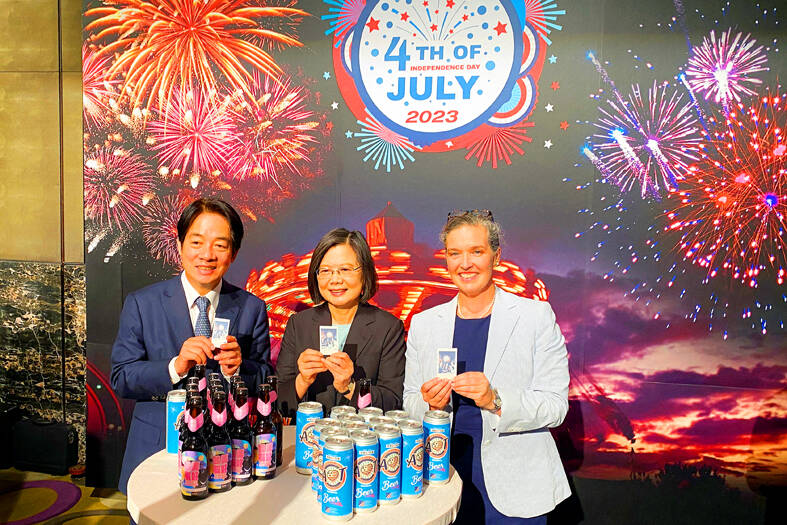The US has deep respect for Taiwan’s democracy and is committed to supporting its self-defense, even in the face of loud complaints from Beijing, American Institute in Taiwan (AIT) Chair Laura Rosenberger said on Thursday.
US “interest in peace and stability across the Strait and our commitments to supporting Taiwan’s self-defense capacity are things we will continue to uphold,” Rosenberger said during a media discussion at AIT’s Washington headquarters.
She was responding to a question about the recent approval of US$440 million in arms sales to Taiwan, the 10th by US President Joe Biden’s administration.

Photo: CNA
“Any complaints from Beijing are not going to change that approach,” she said.
In May, US Secretary of Defense Lloyd Austin confirmed at a Senate hearing that the US would also soon send Taiwan US$500 million in stockpiled military equipment using the presidential drawdown authority (PDA), but nothing has been formally announced so far.
The PDA option was brought into play to help Taiwan get access to weapons quickly amid delays in US deliveries of arms ordered by Taiwan, with reports putting the backlog at US$19 billion of weapons.

Photo: Ben Blanchard, Reuters
Asked if the lack of action was due to US Secretary of State Antony Blinken’s recent trip to China, Rosenberger said she did not have anything specific on the PDA beyond what Austin said before Congress.
Rosenberger also spoke briefly about her trip to Taiwan last month, when she met Taiwan’s presidential candidates and some of their advisers.
“I’ve really valued the opportunity to get to know them, to understand better each of their policies and their priorities, and to really build relationships with each of the candidates,” she said.
Rosenberger rejected the idea that the conversations with the candidates were “interviews” designed to assess their policies, as some have suggested.
“I’d actually just like to make really clear that that’s not at all the purpose of these conversations,” she said, adding that US policy is “not going to change based on which candidate is in office.”
On the topic of double tax avoidance, she said it is an issue that is very high on the radar of policymakers in Washington, as well as for Tsai and her colleagues.
“There are efforts to explore what might be possible,” she said, but added that she did not have anything specific at this time.
Meanwhile, in Taipei, Tsai told a US Independence Day celebration that Taiwan’s close partnership with the US would continue to grow no matter who becomes the next leader of Taiwan.
Speaking at the reception on Thursday hosted by the AIT, Tsai said the enduring relationship between the two nations was planted decades ago “when the US supported Taiwanese people in pursuing democracy.”
“Since then, and at every critical juncture of Taiwan’s political history, the United States was always there to lend assistance and encouragement to Taiwan,” she said.
Bilateral investment is also increasing at an unprecedented rate, Tsai said, adding that this cooperation has helped provide the world with reliable and secure supply chains.
Since she assumed office in May 2016, Tsai said Taiwan and the US have done “quite a lot together and the results have been remarkable.”
“This partnership will continue to grow no matter who the next president of Taiwan is,” she said.
Tsai appealed to the three presidential candidates who joined Thursday’s reception — Vice President William Lai (賴清德) of the Democratic Progressive Party (DPP), New Taipei City Mayor Hou You-yi (侯友宜) of the Chinese Nationalist Party (KMT) and former Taipei mayor Ko Wen-je (柯文哲) of the Taiwan People’s Party.
“I’m sure all the presidential candidates who are here tonight would agree with me without hesitation. Do you want to raise your hands and say yes?” she said, eliciting good-natured laughter from the crowd.
AIT Director Sandra Oudkirk said in her address that the Washington-Taipei partnership is closer than ever, pointing to how bilateral trade increased by nearly 20 percent last year.
She also thanked Tsai for working with her on strengthening and expanding US-Taiwan relations since she took up the post in July 2021.
“Your commitment to ensuring the peace and prosperity of Taiwan is constant, and the United States appreciates your steady leadership in the face of an increasingly complex geopolitical climate,” she said.
Thursday’s reception marked the first time Tsai attended the reception in person since assuming office in May 2016. In July 2016, she delivered a pre-recorded address.
The reception was also attended by a delegation of visiting US Republican representatives who were on a five-day visit that began on Monday.

A magnitude 5.6 earthquake struck off the coast of Yilan County at 12:37pm today, with clear shaking felt across much of northern Taiwan. There were no immediate reports of damage. The epicenter of the quake was 16.9km east-southeast of Yilan County Hall offshore at a depth of 66.8km, Central Weather Administration (CWA) data showed. The maximum intensity registered at a 4 in Yilan County’s Nanao Township (南澳) on Taiwan’s seven-tier scale. Other parts of Yilan, as well as certain areas of Hualien County, Taipei, New Taipei City, Taoyuan, Hsinchu County, Taichung and Miaoli County, recorded intensities of 3. Residents of Yilan County and Taipei received

TRUST: The KMT said it respected the US’ timing and considerations, and hoped it would continue to honor its commitments to helping Taiwan bolster its defenses and deterrence US President Donald Trump is delaying a multibillion-dollar arms sale to Taiwan to ensure his visit to Beijing is successful, a New York Times report said. The weapons sales package has stalled in the US Department of State, the report said, citing US officials it did not identify. The White House has told agencies not to push forward ahead of Trump’s meeting with Chinese President Xi Jinping (習近平), it said. The two last month held a phone call to discuss trade and geopolitical flashpoints ahead of the summit. Xi raised the Taiwan issue and urged the US to handle arms sales to

Taiwan has secured another breakthrough in fruit exports, with jujubes, dragon fruit and lychees approved for shipment to the EU, the Ministry of Agriculture said yesterday. The Animal and Plant Health Inspection Agency on Thursday received formal notification of the approval from the EU, the ministry said, adding that the decision was expected to expand Taiwanese fruit producers’ access to high-end European markets. Taiwan exported 126 tonnes of lychees last year, valued at US$1.48 million, with Japan accounting for 102 tonnes. Other export destinations included New Zealand, Hong Kong, the US and Australia, ministry data showed. Jujube exports totaled 103 tonnes, valued at

BIG SPENDERS: Foreign investors bought the most Taiwan equities since 2005, signaling confidence that an AI boom would continue to benefit chipmakers Taiwan Semiconductor Manufacturing Co’s (TSMC, 台積電) market capitalization swelled to US$2 trillion for the first time following a 4.25 percent rally in its American depositary receipts (ADR) overnight, putting the world’s biggest contract chipmaker sixth on the list of the world’s biggest companies by market capitalization, just behind Amazon.com Inc. The site CompaniesMarketcap.com ranked TSMC ahead of Saudi Aramco and Meta Platforms Inc. The Taiwanese company’s ADRs on Tuesday surged to US$385.75 on the New York Stock Exchange, as strong demand for artificial intelligence (AI) applications led to chip supply constraints and boost revenue growth to record-breaking levels. Each TSMC ADR represents